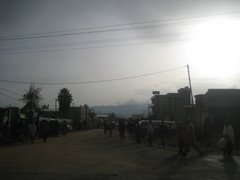Today the World Bank Provides US$175 Million Grant to Combat Food Insecurity in Ethiopia

Why would you give a country that is at war money? Shouldn't all aid to that government be frozen since it is an unstable government? However, the Governments of the the United States, United Kingdom, Canada, Ireland, Sweden, and the European Union are funding a 175 million dollar project. This project and money will be managed by the government of Ethiopia and a World Bank team.
News Release No. 2007/200/AFR
Media Contacts In Washington: Timothy T. Carrington(202) 473 8133 - Email: tcarrington@worldbank.org In Addis Ababa : Gelila Woodeneh (251- 011) 662 7700 - Email: gwoodeneh@worldbank.org
World Bank Provides US$175 Million Grant to Combat Food Insecurity in Ethiopia
WASHINGTON, January 9, 2007 - The World Bank Group board today approved a US$175 million grant to help vulnerable populations in Ethiopia lower their risks of serious food shortage and famine.
The grant finances the second phase of an existing operation, the Productive Safety Net Program (PSNP), which is reaching over 7 million of the poorest Ethiopians through public works and direct grants. The targeted beneficiaries of the program are chronically food insecure households which are unable to secure sufficient food for their families year after year. The grant will provide continuing funding for the program , while supporting improvements in the program governance and efficiency.
The PSNP was initiated in 2005, after the Coalition for the War against
Hunger-- comprising the Government of Ethiopia, its development partners, and key NGOs-- pushed for more sustainable alternatives to the annual provision of large amounts of humanitarian food aid to prevent starvation. The program initially reached about 5 million chronically food-insecure people, then was scaled up in 2006 to reach 7.23 million people. The PSNP supports a large-scale public works initiative which pays wages to food insecure but able-bodied citizens. For those physically unable to work, the program provides direct grants.
Ethiopias vulnerability to famine has worsened over the past two decades. When needed, food aid saves lives. However, the Government of Ethiopia and its international partners have wanted to avoid a situation where a segment of the population remains chronically dependent on international food aid. Indeed, by 2005, food insecurity, and widespread dependency on humanitarian aid for survival, had become a pressing national security risk. The PSNP was devised as a sustainable solution.
To boost the productivity of small scale agriculture in targeted areas, the PSNP jobs program has supported a massive effort of environmental restoration. Some of the tangible results: more than 250,000 kilometers of terraces; 20,000 ponds and 2,000 springs; 17 million newly planted trees and the construction and maintenance of 10,000 kilometers of rural roads. By replacing food aid with jobs and cash payments, the program helps stimulate rural economies while also addressing some of the underlying causes of food insecurity. The added benefit of improving public infrastructure and maintaining community assets through public works will also bring long term improvement to rural livelihoods.
The first phase of the Productive Safety Net Program has dramatically lowered dependence on emergency food aid; instead, were supporting targeted populations through predictable transfers for productive investments, which represent a first real opportunity to bring about lasting change by addressing some of the root causes of food insecurity, said Ishac Diwan, Country Director for Ethiopia. In the next phase the Government will continue the jobs program and direct grants, while strengthening program governance. The program also introduces a contingency fund to be triggered without delay in the event of a drought.
The Safety Net Program is being supported by many donors and NGOs. The second phase is co-financed by the Governments of the United Kingdom, Canada, Ireland, Sweden, and the United States, as well as by the European Union. The World Food Program also supports the program.
In recent years, Ethiopia has posted a comparatively strong growth performance, while increasing the portion of the national budget dedicated to poverty-reduction spending. Though starting from a low base, the country has begun to show progress toward achieving some of the Millennium Development Goals including strong gains in increasing school enrolment and lowering malnutrition. It is estimated that between 2000 and 2005, the level of poverty fell from 44.2 percent of the population, to 38.7 percent.
Click on blog title to go to article and project description.


























